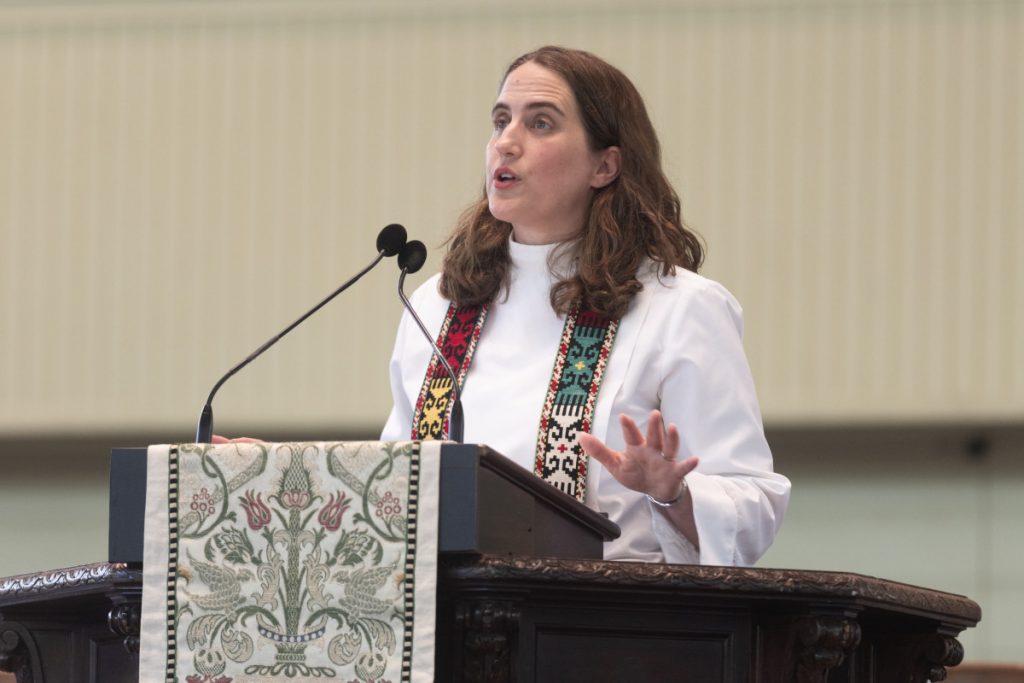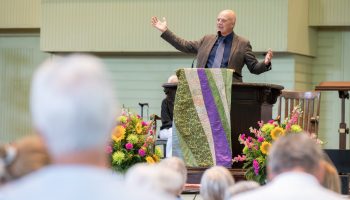
The Rev. Leyla King opens her sermon series Sunday morning in the Amphitheater, preaching on “Reasons to Dance.”
“Dance is what happens when we move our bodies to express what is in our souls. The movement of our bodies speaks to the longings of our heart, our embodied grief, our joy,” said the Rev. Leyla King.
King preached at the 9:15 a.m. Monday morning worship service in the Amphitheater. Her sermon title was “The Dance of Faith,” and the scripture text was Matthew 26: 26-30.
When King and her husband traveled to Jordan and Syria, their friend Ahmed took them to Maaloula, a village outside of Damascus where Aramaic, the language of Jesus’ time, is still spoken. There was a funeral in the village and they stopped to watch.
“There was a trumpeter and a drummer and what they played was not music, but it was not random noise,” King said. “People were singing their grief. As they moved their bodies, it was like each body moved as one organism, like a school of fish or a flock of birds.”
The villagers held the coffin high over their heads, but they never dropped it. “Their movement spoke of grief and of the love for the one lost. As people of faith, it is one way to get through times of grief. This movement connects us to others, connects us to love. Human suffering puts human love in relief.”
It is during times of suffering, King told the congregation, that we find out how much we rely on others to ease that suffering. This is revealed through embodied acts that shower us with care.
“It could be a voice on a phone, someone coming by to feed you, to hold you,” she said. “This is the dance of love, even though you are in the valley of the shadow.”
The night before his greatest suffering, something that was imminent, Jesus tried to show his love to his disciples. Jesus said to them, “take, eat; this is my body. This cup is my blood.”
“This choreography of a dance was to get the disciples through the next days and us through generations,” King said. “We remember his suffering and his love. Love makes Jesus present as we still break bread and drink wine.”
There is a non-canonical version of the Last Supper in the Acts of John. In this gospel, after the supper, Jesus led the disciples in a dance. They formed a ring around him and sang a hymn to God.
John wrote: “Jesus said ‘Glory be to thee, Father.’ And we, going about in a ring, answered him: Amen. Glory be to thee, Word: Glory be to thee, Grace. Amen. Glory be to thee, Spirit: Glory be to thee, Holy One: Glory be to thy glory. Amen. … The Whole on high hath part in our dancing. Amen.”
King called this vignette Jesus’ own embodiment and “our faith in him as incarnation in the world is faith experienced in our bodies, lived in our bodies in joy and sadness.”
She told the congregation, “Like the first disciples, after we share the Last Supper, we dance. In his suffering, we see ours; we see the riskiness of the life of faith and our love for one another.”
King continued, “If you have ever watched the agony of a loved one’s slow death, or gone through hardships, or take to heart the evils of the world, when these things seem too great to survive and the cost is impossible, our comfort is Jesus, in whom we are never alone.”
When we face the specter of death, King told the congregation, it is with Christ that we suffer and dance our way through. “We carry each other’s suffering; we express our faith to lighten the burden and to enlighten the world.”
King said, “We mimic the steps of the dance Jesus showed us. We serve, we honor our shared humanity; we trust in God’s goodness. The dance given by God of embodied faith sustains us all our days. Glory be to thy glory.”
The Rt. Rev. Eugene Taylor Sutton, senior pastor for Chautauqua, presided. The Rev. George Wirth, longtime associate of the Chautauqua Department of Religion, read the scripture. Owen Reyda, 2024 organ scholar, played “Andante,” from Grand pièce symphonique, by César Franck, for the prelude on the Massey Memorial Organ. The Motet Choir, under the direction of Joshua Stafford, director of sacred music and the Jared Jacobsen Chair for the Organist, and accompanied by Reyda, sang “Listen, sweet dove,” with music by Grayston Ives and words by George Herbert. Stafford played “Sortie,” by César Franck, on the Massey Organ for the postlude. Support for this week’s services and chaplaincy is provided by the Alison and Craig Marthinsen Endowment for the Department of Religion.




